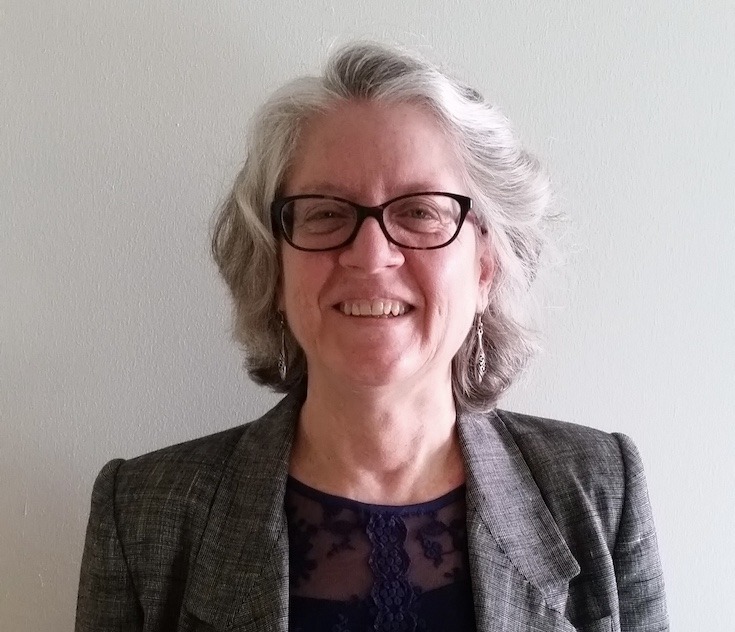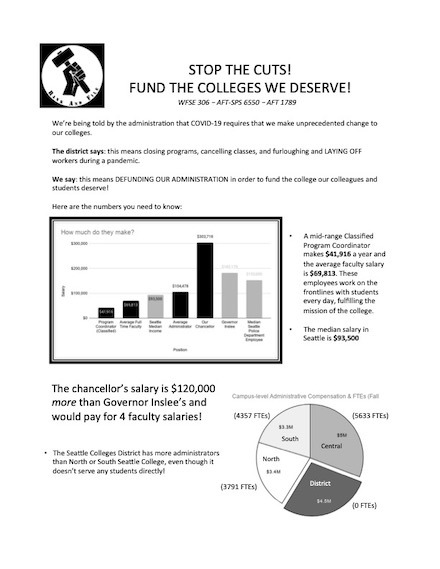In an anonymous letter from a Seattle Colleges tenured faculty member, included in the opening wage proposal by the American Federation of Teachers Seattle Local 1789 (AFT) to the Seattle Colleges District (SCD) in March, 2022, the teacher explains the trials they have endured due to ongoing contract negotiations that have left teachers at Seattle Colleges without a salary increase for the last three years.
“How quickly can a tenured faculty member become homeless?” the anonymous teacher asks. The question sounds more than rhetorical. “…Seattle was already pricing us out of rental options,” the teacher continues.
“We ended up outside of the Seattle city limits with rent that was expensive to us, but we were just making it on our two paychecks. Then my husband lost his job… Suddenly it became apparent that we were not going to be able to make the monthly rent.”
With the sharp increase in Seattle’s cost of living due to inflation and the pandemic, it’s not difficult to imagine why faculty members are pushing for an adequate raise. However, faculty’s fight for a salary that matches cost of living isn’t a new struggle. “We had an eight year period there where we didn’t get any COLAs [Cost-of-Living Adjustment]…” says Dr. Peter Knutson, professor of anthropology and AFT member at SCC. With no raise, and the expenses of living in the Seattle area ever increasing, “you’re essentially getting a pay cut,” Dr. Knutson adds.

In 2020, the college ratified a three-year contract with the understanding that faculty salaries would be negotiated at a later date in order to solidify the contract in a timely manner. However, an e-mail written by Tracy Lai, a tenured history instructor and former co-president of AFT, stated that, “For the first 3 [salary] negotiation sessions, administration offered ZERO to increase faculty base salaries. Faculty have been waiting for the last three years.”
In April, AFT pushed for “a 15% general wage increase for faculty” as well as a “demand that faculty have full access to… negotiation sessions,” according to an email from David Krull, former AFT Lead Negotiations Chair, debriefing faculty on the results of their early April negotiation session with the SCD. In the email, Krull states that the session resulted in the SCD counter–offering a “zero (0.0%) pay increase for all faculty over the entire 3-year term of [their] current Contract” and a proposal for a “limit to 8 observers to comment on what they observe.” Along with the battle for a wage increase, the email states that, “Faculty have the right to hear directly from leadership about the decisions they are making.”
Helena Ribeiro, a tenured faculty member in English and AFT Senate President, elaborated on this objective on her own behalf, saying, “If you’re going to tell us we get a 0% increase, I want you to say it in front of me and 99 of my best friends.”
“The frustration level is enormous,” says Knutson. With the undeniable fact that Seattle’s cost of living has risen dramatically in the last few years, why is the SCD not increasing their teachers’ salaries? According to AFT’s opening wage proposal, “SCD repeatedly claims that it doesn’t have the funds internally (local funds) to pay for a pay increase for faculty.”
“A year ago, they were predicting about a $31 million shortfall,” voices Knutson. Earlier this year, a Zoom conference led by Terrence Hsiao, former Vice Chancellor of Finance and Operations, revealed an adjusted, yet still astonishing, shortfall of $15 million deficit. The immense forecasted debt that loomed over SCC has been one of the primary excuses for Administrative Service’s refusal to increase faculty salary. This budget forecast not only caused monetary restriction from the SCD – attempting to cut technical programs, declining to offer faculty a salary increase, and not filling staff vacancies among other restrictions –, but it also affected school morale.
“That doomsday budget was a worst-case scenario when things were already feeling really bad,” Ribeiro commented, “that does something to people.”

Yet, the fear and concern that the shortfall produced was mostly for nothing: the 2021-2022 fiscal year budget deficit amounted to just $3 million, according to an Oct. 19 email from Hsiao to the Seattle College’s community in which he also announced his immediate resignation.
In regard to the inaccurate budget’s effect on faculty, Annette Stofer, AFT Seattle President, says that “disappointing isn’t strong enough a word.” Ribeiro concurs, sharing, “That budget reflects a carelessness at the district level that has been so focused on streamlining and the bottom line that, like, of course they came up with this budget.” Knutson voices the thoughts of over 50 faculty members who have been observing the joint sessions between AFT and SCD, highlighting the initial budget forecast. “Then the question is: okay, you got $28 million dollars that they had extra… where did that come from?”
Questioned on how this mistake occurred, Wendy Rockhill, Interim Vice President for Instruction and Planning, says that the “understanding today is that the key contributors” to the budget discrepancy include “vacancy savings… exacerbated this year by a ‘Great Resignation’ increase in departures”, an overestimation of costs due to the “benefits base that was used for forecasting…[,] unexpected savings in goods and services” that needs to be investigated further, and “understaffing across the district” which “impeded staff’s ability to generate and share data.”
Reasons for the miscalculation aside, faculty members have yet to see their salaries increase. With the SCD continuing to hold out on raising salaries, faculty members wonder whether the budget’s being used by the administration as a weapon. “The budget is always a tool,” says Stofer.

“Were they deliberately excluding other sources of revenue to make their negotiating position more strong with the faculty?” Knutson wants to know. The budget scare has not only affected pay raises, but “it’s been used to curtail student services and IT,” Ribeiro adds.
Although the deficit prediction from earlier this year leaves the college with over $15 million more than expected, Rockhill states that “we still have debt, it’s less than anticipated, but still a debt (as in no ‘extra funds’)…” But with around only 44% of the operating budget going towards instruction – which has been declining each and every year – faculty members point to how money is spent at the district level as a root issue.
“You’ve got a boat where there’s more weight up above and less and less weight down below,” says Knutson, indicating that administrators get paid more than they need. A handout made by the AFT’s Rank-and-File, an independent entity within the union, highlights this concern, stating “The chancellor’s salary is $120,000 more than Governor Inslee’s and would pay for 4 faculty salaries!” In 2021, former Seattle Colleges chancellor, Shouan Pan, received a salary of $319,700.

So, the fact remains that SCC teachers are struggling to make ends meet without a raise in salary. “We’re really feeling it… I, personally, can feel the squeeze monthly, and it’s getting tighter,” says Ribeiro. In a 2022 AFT faculty survey, “63% of faculty responded they’ve had to take a second job to support their families due to the low wages paid by Seattle Colleges” and “83% of faculty surveyed report they and their families have been negatively impacted by the low wages paid by the Colleges during the last year.” According to the AFT’s opening wage proposal, “Seattle Colleges Faculty are currently paid 40% below a living wage within Seattle.”
To instructors like Knutson, these circumstances are inequitable; as he puts it, classrooms are where the “rubber hits the road” and “what [college] is supposed to be about.”
The faculty union now considers what may be their only option: a strike. “The only pressure that you can bring on [administration] is the prospect of withholding your labor,” says Knutson. “In an Oct. 14 faculty meeting,” according to Tracy Lai, “it was voted that our union AFT Seattle 1789 should hold a strike authorization vote by the end of fall quarter. An authorization does not call for an immediate strike. An authorization gives power to the union leadership and Negotiations Team to use this tool if circumstances merit it.”

Strike or not, the funds given to faculty affect everyone, including the student population. “It’s not just about the salary, but our working conditions and student learning conditions, which are one in the same,” says Ribeiro. How we are taught and the environment we get to learn in is directly impacted by the resources given to our teachers, and, according to Stofer, “[instructors] work really hard to put all the pieces in place to make it the best for students… but we need people to know how low pay is affecting [faculty] to even stay here.”
“It’s hard for faculty to inspire students for upward mobility when they, themselves, are having a tough time,” adds Knutson. While faculty have been battling in negotiations with administration for the past three years, Ribeiro reveals who could really make a difference. “But you know who [administration] will listen to? Students.”
“When it’s students saying: this is how these things are impacting my ability to learn and my continuation at this college, then they’re like ‘what do you need?’” she adds.
Students, who continue to be directly affected by the deficit, have a voice. Whether it be used to support the instructors that make SCC the strong-knit community that it is, urge administration services to find adequate funding from the state, which has been disinvested in public colleges, or push for the defunding of administrative positions in order to properly fund instruction, student opinion makes a difference. And with SCC’s high population of part-time students leading to further underfunding at the state level, the school relies on tuition, which not only places more pressure on students financially, but also leaves room for budget mishaps, such as what occurred when COVID-19 caused a decline in international students and their subsequent payment to the college. “When they underfund the community colleges, what it’s really about is discrimination on the basis of class and race,” explains Knutson. Proper funding from both the state and district level could create equitable change not only for faculty, but for the students of SCC, arguably a population that would receive great benefits from financial assistance and quality education.

With new faces in the SCD administration, along with a fresh three-year contract to begin in 2023, hope remains. Negotiations for the new contract are already being crafted. “This time, we’re getting a head start,” says Ribeiro.
“I love to teach,” the anonymous faculty member concludes their letter. “But it’s pretty sad when I’m not able to afford living in the same place I work. Seattle Public School teachers make a living wage. We need one too!”







Be First to Comment